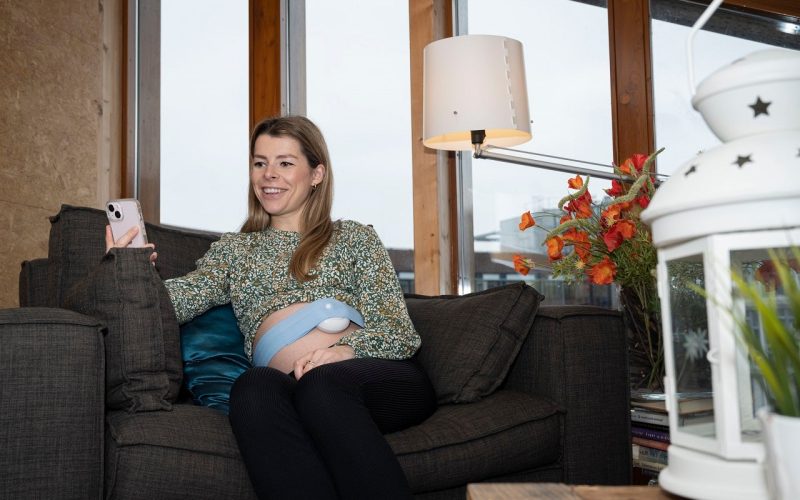Telemonitoring at home of complicated pregnancies is as safe for the outcome of the pregnancy as hospitalisation. It saves lying days and thus costs. Mothers are also more satisfied with the care than mothers who had to be hospitalised during their pregnancy. Researchers from UMC Utrecht and Erasmus MC publish their findings today in the leading scientific journal Lancet Digital Health.
Women with complicated pregnancies often require hospitalisation. For example, the women have hypertension, ruptured membranes or the unborn child has growth retardation. Sometimes the women lie in hospital for weeks on end; daily heart films are taken, symptoms checked and blood pressure measured. There, they face serious hospital problems. This can make them anxious and gloomy. And they miss their partner and family.
Prof Mireille Bekker (UMC Utrecht) and Prof Arie Franx (Erasmus MC) therefore launched a study together to see whether telemonitoring from home was a safe option. Telemonitoring at home is a promising alternative that meets a global need in (obstetric) healthcare. The Covid-19 pandemic has accelerated the transformation to digital care in many areas of healthcare. Bekker and Franx investigated safety, patient satisfaction and cost of home telemonitoring compared to hospital care in complicated pregnancies. The results of the study fall in favour of telemonitoring.
Home monitoring appeared to be a safe alternative. Four weeks after delivery, there were additionally no differences in mental and physical well-being between the participants in the telemonitoring group and in the control group. ‘There was clearly greater satisfaction among the patients who had daily home heart checks and blood pressure measurements,’ says Mireille Bekker. ‘Moreover, healthcare costs per patient decreased by 18 per cent because we were able to reduce hospital admissions. Healthcare costs are rising and there is a huge shortage of healthcare staff, so we have a shared responsibility to redesign healthcare in a safe affordable way that puts the interests of the patient first. This study shows that it can be done and is an example of the innovative transition in healthcare anno 2022.’
There were 200 pregnant women participating in the study from UMC Utrecht and 5 more Dutch hospitals participating. The main outcome measure of the study was composed of a number of adverse pregnancy outcomes for mother or child (or both). The study had a so-called ‘non-inferiority’ design in which it was established beforehand that differences for the main outcome measure up to 10% would be seen as evidence that telemonitoring is no less good than hospitalisation.
Bekker and Franx: ‘This first randomised trial is high-quality evidence that telemonitoring can be as safe as hospitalisation for monitoring complicated pregnancies, with reduced costs and higher patient satisfaction. The findings are important in the search for alternatives to expensive hospitalisation, for example treatments done at home under the responsibility of a medical specialist. The Integral Care Agreement also pays a lot of attention to this.’
Funded by Achmea Healthcare Foundation (grant number Z659) and supported by ICT Healthcare Technology Solutions.
